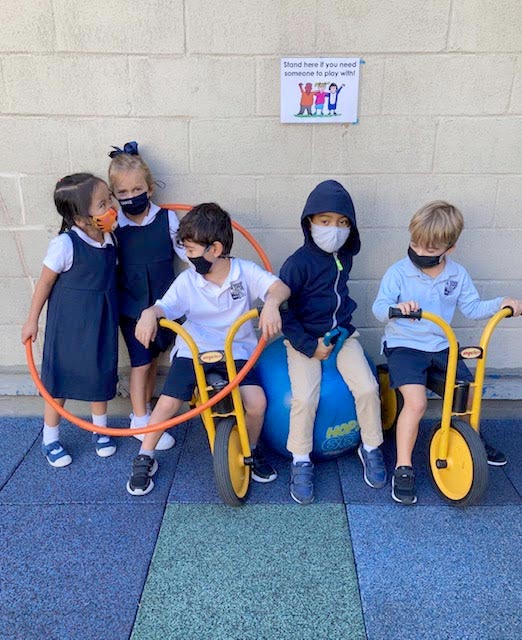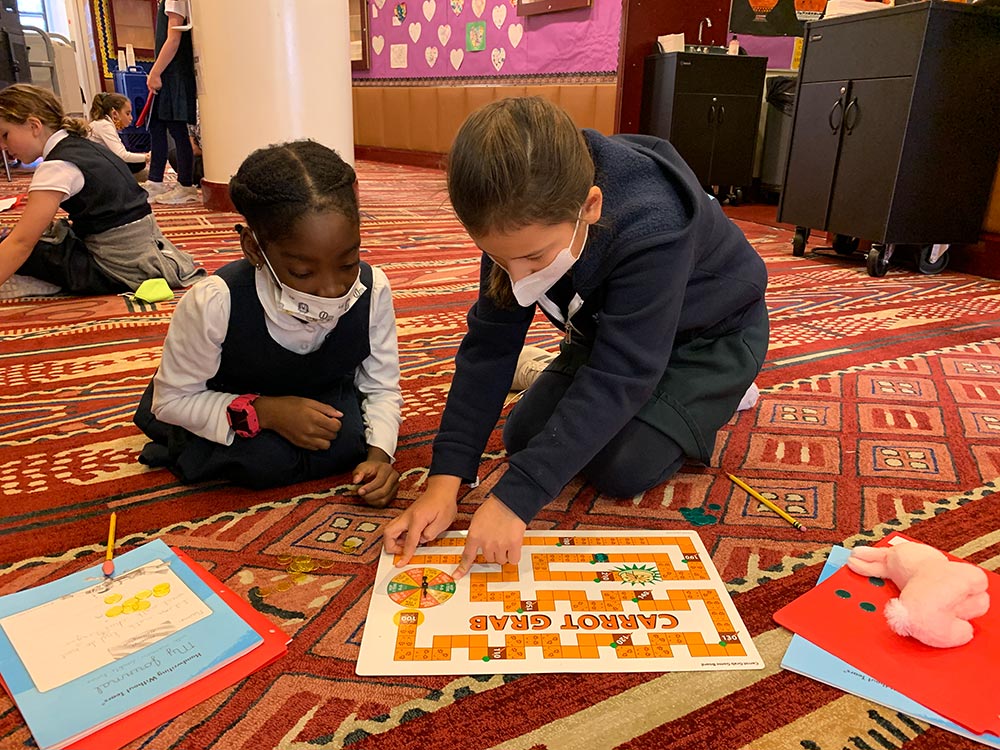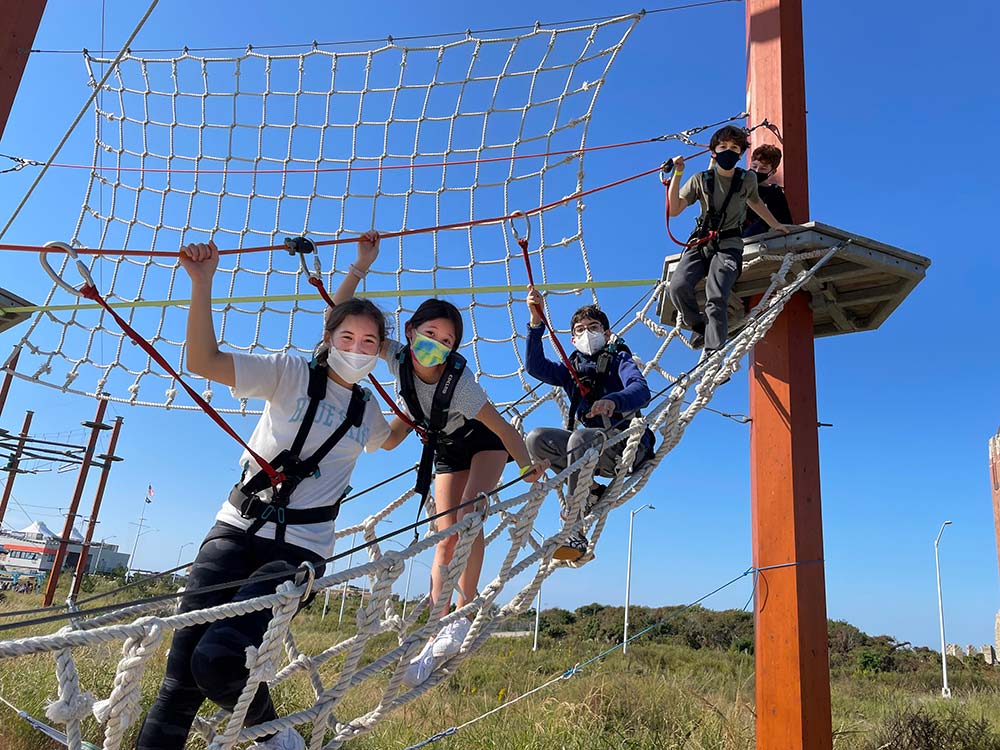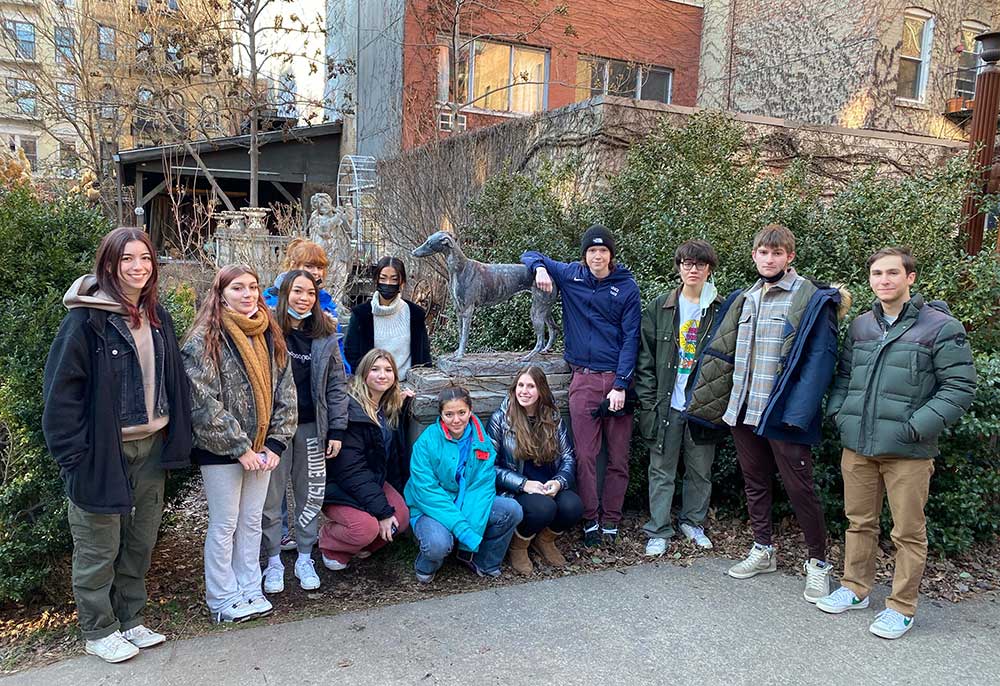Community in the Classroom
In the walk up to the Junior Kindergarten classrooms, it isn’t uncommon to hear an abundance of laughter from the staircase as students enjoy their daily recess. Beyond being the space that allows for children to enjoy the outdoors, the play roof is also where many of our youngest students encounter community building for the first time. Walk onto the play roof and you are almost immediately greeted with a sign that reads, “Stand here if you need someone to play with.” Look over to that spot at any point and you’ll often see groups of children approaching their peers, inviting them to join in on an activity.
 Early Childhood students stand with the “Stand here if you need someone to play with” sign
Early Childhood students stand with the “Stand here if you need someone to play with” sign
In a way, that sign speaks for one of the constants of the Grace experience. As students grow, so too does the expansiveness of their education. In Early Childhood, students learn the fundamentals: how to read, write and do arithmetic. And it is the intention that, by the time they reach high school, students are able to use those early lessons to think critically, whether it be challenging a piece of literature or solving sprawling calculus problems. No matter what they are engaged in, the message of the play roof sign underscores every students’ time at Grace: that a strong sense of community is essential to a strong education.
With the pandemic still in the background of daily life, this concept has remained paramount as we began this school year entirely in-person. No matter the division, our faculty and staff were concerned with ensuring that students felt supported as they got acclimated to being at school and around their peers again. In the lower school, one solution came in the form of friendship groups, organized by new JK-4 school counselor, Miso Mtangi-Chin. In each group, students in Grades 2-4 play games and collaborate on art projects that often open the door to bond over their emotions, identities and communities. “Play can elicit conversation about things that students want to process,” Ms. Mtangi-Chin says. “It’s an important tool to help children feel at home in their bodies and learn to be confident in the classroom.”
Play continuously emerges as a fixture in lower school classrooms, allowing for more relaxed ways for students to work through the material they’re learning. In October, for example, third graders spread out in the Egg to play board games that helped bolster their ability to add multiples of ten. In between murmurs of friendly competition, you could hear students asking one another questions when they were struggling to understand a concept. Play provided a common ground and a common goal, creating a less daunting environment for students to grow as learners. They since have moved on to playing games that help bolster their skills around decimals, and with the foundations of community already built, the questions they ask of one another will surely continue.
 Third graders play a board game to help them practice adding multiples of 10
Third graders play a board game to help them practice adding multiples of 10
Skip ahead a few grades and middle school teachers found themselves faced with a similar predicament. Middle school can be difficult for students as they figure out how to navigate socially, but there was now the added hurdle of bridging the gap between those who came to school in cohorts (therefore seeing fewer peers day to day) and those who were entirely remote last year, as well as those who were entirely new to the school. So in the fall, middle schoolers took part in in grade-level retreats to Jones Beach in the fall. Through tackling ropes courses and conducting beach clean-ups “students [had] a way to socialize as a full grade in a structured setting, all without the pressure of reconnecting,” said Head of Middle School Elsa Hepner.
 Students enjoy a rope course at Jones Beach
Students enjoy a rope course at Jones Beach
Though the bonding at Jones Beach occurred in earlier in the year, the sentiment it created could be felt all the way through the wintertime during many of Grace’s holiday traditions. Holiday Shopping, for example, always gets middle schoolers buzzing with excitement as they curate wish lists of things to buy for family and friends. Their newfound value and understanding of community, however, appeared not while checking off their lists with friends, but when helping their early childhood book buddies navigate a decked-out Tuttle Hall. Through Holiday Shopping, they experience being leaders at Grace for the first time, which ultimately has the effect of building their confidence overall, whether or not they’re in the classroom. The opportunity to learn through leadership carries through to the high school.
A favorite leadership opportunity is Cross Grade Connection (CGC), which brings middle school students together for weekly meetings co-led by an eleventh grade peer leader and a faculty member. Similarly to the Lower School’s friendship groups, students partake in activities that help them to “start talking to each other and [build] excitement” about getting to know one another, says peer leader Karis B. ’23.
Leadership continues in the classroom through weekly Lab Days, in which students take ownership of their studies. Lab Day offerings give students the flexibility and freedom to explore their own interests, create the culture of the High School and contribute to the life of the community; courses include topics in health, wellness, diversity, service learning and belonging. As Isabella G. ’23 shares, “Figuring out who you are and what you believe in are an essential part of growing up.” Each class invites students to freely discuss their opinion through the lens of course materials, sparking conversations that broaden their sense of self and community. Isabella continues, “I like having classes that help us understand the choices we have and [make us] think about how we want to move through life.”
 High Schoolers on a Field Trip to the Elizabeth Street Gardenas a part of their “Activist Reporting in the Bowery” Lab Day Class
High Schoolers on a Field Trip to the Elizabeth Street Gardenas a part of their “Activist Reporting in the Bowery” Lab Day Class
It’s that same spirit that students first experience on the play roof. Through supporting each other, sharing and discovering their interests and being willing to take risks, Grace students create a community where they can thrive and become responsible, caring and engaged citizens.